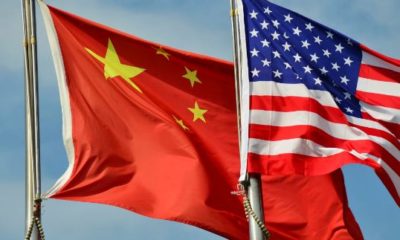World
Air pollutants can increase risk of numerous cancers
 Hong Kong : Long-term exposure to environmental pollutants is associated with increased risk of mortality for many types of cancer, a new study warns.
Hong Kong : Long-term exposure to environmental pollutants is associated with increased risk of mortality for many types of cancer, a new study warns.
This study in an elderly Hong Kong population focused on ambient fine particulate matter, or matter with an aerodynamic diameter of less than 2.5 micrometers (PM2.5).
Particulate matter is the term for particles found in the air, including hydrocarbons and heavy metals produced by transportation and power generation, among other sources.
The researchers found that for every 10 microgram per cubic meter (µg/m³) of increased exposure to PM2.5, the risk of dying from any cancer rose by 22 percent.
“Long-term exposure to particulate matter has been associated with mortality mainly from cardiopulmonary causes and lung cancer, but there have been few studies showing an association with mortality from other cancers,” said one of the researchers Thuan Quoc Thach from the University of Hong Kong.
“We suspected that these particulates could have an equivalent effect on cancers elsewhere in the body,” Thach noted.
The study was published in the journal Cancer Epidemiology, Biomarkers & Prevention.
The researchers recruited 66,280 people aged 65 or older between 1998 and 2001, and followed them until 2011, ascertaining causes of death from Hong Kong registrations.
Annual concentrations of PM2.5 at their homes were estimated using data from satellite data and fixed-site monitors.
The researchers found that increases of 10 microgram per cubic meter of PM2.5 were associated with a 42 percent increased risk of mortality from cancer in the upper digestive tract and a 35 percent increased risk of mortality from accessory digestive organs, which include the liver, bile ducts, gall bladder, and pancreas.
For women, every 10 microgram per cubic metre increase in exposure to PM2.5 was associated with an 80 percent increased risk of mortality from breast cancer, the study said.
The team believe that possible explanations for the association between PM2.5 and cancer could include defects in DNA repair function, alterations in the body’s immune response, or inflammation that triggers angiogenesis, the growth of new blood vessels that allows tumours to spread.
In the case of the digestive organs, heavy metal pollution could affect gut microbiota and influence the development of cancer.
World
Lockdowns in China Force Urban Communities to Defy Censorship and Vent Frustration Online

Shanghai’s rich middle class is leading a wave of online dissent over the strict and prolonged lockdowns imposed in various parts of the country. Chinese internet censorship is struggling as patience is wearing thin in many urban centers, coming up with creative forms of online protests.
Social Media Posts Revealing Lockdown Tension in Shanghai
Drawn-out lockdowns are nothing new in China as authorities insist with the nation’s zero-Covid policy since the start of the pandemic. Currently over This time around, however, metropolitan areas like Shanghai are increasingly difficult to keep quiet, given that its more than 25 million residents have seen weeks of total isolation along with food shortages and many other service interruptions.
Dozens of towns and reportedly over 300 million Chinese citizens have been affected by lockdowns of different severity. As expected, urban netizens have been most outspoken over their difficulties by finding creative ways to get around state censorship and bans placed on topics, news comments and spontaneous campaigns.
Shanghai residents have been using mobile proxies and hijacking seemingly unrelated hashtags to talk about healthcare issues, delivery failures and the overall severity of their situation. The “positive energy” that the Chinese government wants to transmit during the recent prolonged series of lockdowns does not come naturally to those counting food supplies and online censors are working hard to filter words, trending topics and undesired social media sharing.
WeChat groups and message threads are under constant monitoring. Posts questioning the zero-Covid approach have been quickly deleted, including by leading Chinese health experts like Dr. Zhong Nanshan. Video footage is soon censored and protests and investigations are quickly made to disappear.
Where this has not worked, officials have exposed banners with warnings and outright threats like “watch your own mouth or face punishment”, while drones have been patrolling the city skies. Yet, if anything, this has led to further tensions and unspoken confrontation with Shanghai’s educated and affluent middle class.
Creative Online Solutions Harnessing Civic Energy
Announcements by Chinese social media that they would be publishing the IP addresses of users who “spread rumors” have not helped either. Tech industry research has shown that much of Asia’s tech-savvy population has a habit of using mobile proxies and other privacy tools, quickly finding workarounds to browse the internet freely and talk to the world about the hottest topics.
The sheer volume of forbidden posts is already a challenge for the very censorship system, experts explain. Unable to track all trending hashtags, state workers overlook topics that speak about the US, Ukraine or other popular news. Linking human rights elsewhere to their situation, Chinese online dissidents establish their informal channels and “hijack” the conversation to share personal or publicly relevant information about the Covid suppression in their town.
Sarcastic and satirical posts still dominate. Others hope to evade the censors by replacing words from famous poems or the national anthem. One thing is certain – social media, when harnessed with the right creativity, has proven its ability to mount pressure on the government in even some of the most strictly controlled tech environments like China.























